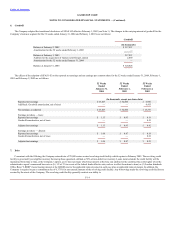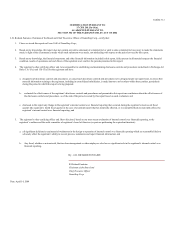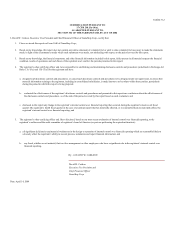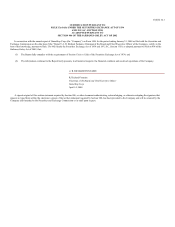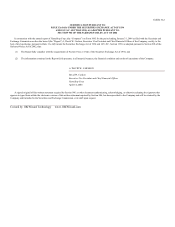GameStop 2003 Annual Report Download - page 65
Download and view the complete annual report
Please find page 65 of the 2003 GameStop annual report below. You can navigate through the pages in the report by either clicking on the pages listed below, or by using the keyword search tool below to find specific information within the annual report.
Exhibit 14.1
GameStop Corp.
CODE OF ETHICS FOR
SENIOR FINANCIAL OFFICERS
GameStop Corp. (the “Company”) is committed to full and accurate financial disclosure in compliance with applicable laws, rules and regulations and to
maintaining its books and records in accordance with applicable accounting policies, laws, rules and regulations. This Code of Ethics for Senior Financial Officers,
applicable to the Company’s Chairman of the Board and Chief Executive Officer, President, Chief Financial Officer, Controller, Vice President-Finance and any
Executive Vice President of the Company (together, “Senior Financial Officers”), sets forth specific policies to guide the Company’s Senior Financial Officers in the
performance of their duties. As Senior Financial Officers, you perform a task that is critical to the Company. This Code is designed to assist you in that task.
The Company’s Code of Business Conduct and Ethics, which this Code of Ethics is intended to supplement, sets forth the fundamental principles and key policies
and procedures that govern the conduct of all of us in our business. You are bound by the requirements and standards set forth in the Code of Business Conduct and
Ethics, as well as those set forth in this Code of Ethics and other applicable policies and procedures.
Compliance with Rules and Regulations
The Company is committed to conducting our business in accordance with all applicable laws, rules and regulations and in accordance with the highest standards of
business ethics. As a Senior Financial Officer, you must not only comply with applicable laws, however. You also have leadership responsibilities that include creating
a culture of high ethical standards and commitment to compliance; maintaining a work environment that encourages employees to raise concerns; and promptly
addressing employee compliance concerns.
Conflicts of Interest
In order to maintain the highest degree of integrity in the conduct of the Company’s business and your independent judgment, you must avoid any activity or
personal interest that creates or appears to create a conflict between your interests and the interests of the Company. A conflict of interest occurs when your private
interests interfere in any way, or even appear to interfere, with the interests of the Company as a whole. You should conduct the Company’s business in an honest and
ethical manner, and never act in a manner that could cause you to lose your independence and objectivity.
Although we cannot list every conceivable conflict, following are some common examples that illustrate actual or apparent conflicts of interest that should be
avoided:
Improper Personal Benefits from the Company
Conflicts of interest arise when an officer or a member of his or her family receives improper personal benefits as a result of his or her position in the Company.
You may not accept any benefits from the Company that have not been duly authorized and approved pursuant to Company policy and procedure, including any
Company loans or guarantees of your personal obligations.
Financial Interests in Other Businesses
Neither you nor your immediate family members may have an ownership interest in any other enterprise if that interest compromises or appears to compromise
your loyalty to the Company. For example, you may not own an interest in a company that competes with the Company. You may not own an interest in a company that
does business with the Company (such as a Company customer/client or supplier) unless you
obtain the written approval of the Audit Committee of the Board of Directors before making any such investment. However, it is not typically considered a conflict of
interest (and therefore prior written approval of the Audit Committee of the Board of Directors is not required) to make investments with a total value of no more than
ten percent (10%) of your annual compensation in competitors, customers/clients or suppliers that are listed on a national or international securities exchange.
Business Arrangements with the Company and Corporate Opportunities
Without the prior written approval of the Audit Committee of the Board of Directors, you may not participate in a joint venture, partnership or other business
arrangement with the Company. If you learn of a business or investment opportunity through the use of corporate property or information or your position at the
Company, such as from a competitor or actual or potential client, supplier or business associate of the Company (including a principal, officer, director or employee of
any of the above), you may not participate in the business or make the investment and must instead inform the Chief Executive Officer (or, with respect to the Chief
Executive Officer, inform the Audit Committee of the Board of Directors). Such an opportunity is an investment opportunity for the Company, not for you individually.
Outside Employment or Activities With a Competitor
Simultaneous employment with or serving as a director of a competitor of the Company is strictly prohibited, as is any activity that is intended to or that you should
reasonably expect to advance a competitor’s interests. You may not market products or services in competition with Company’s current or potential business activities.
It is your responsibility to consult with the Chief Executive Officer (or, with respect to the Chief Executive Officer, consult with the Audit Committee of the Board of
Directors) to determine whether a planned activity will compete with any of the Company’s business activities before you pursue the activity in question.
Outside Employment With a Customer/ Client or Supplier
Without the prior written approval of the Audit Committee of the Board of Directors, you may not be a customer/client or be employed by, serve as a director of or
represent a customer/client of the Company. Similarly, without the prior written approval of the Audit Committee, you may not be a supplier or be employed by, serve
as a director of or represent a supplier to the Company. Nor may you accept money or benefits of any kind from a third party as compensation or payment for any
advice or services that you may provide to a client, supplier or anyone else in connection with its business with the Company.



